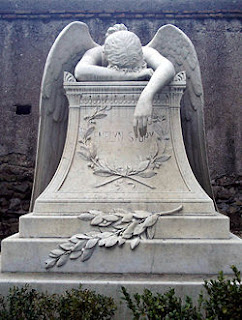1 Corinthians 13:4-8
New American Standard Bible (NASB)
4 Love is patient, love is kind and is not jealous; love does not brag and is not arrogant, 5 does not act unbecomingly; it does not seek its own, is not provoked, does not take into account a wrong suffered, 6 does not rejoice in unrighteousness, but rejoices with the truth; 7 bears all things, believes all things, hopes all things, endures all things. 8 Love never fails; but if there are gifts of prophecy, they will be done away; if there are tongues, they will cease; if there is knowledge, it will be done away.
Willa Cather was an American novelist who wrote stories about life on the Great Plains. In a novel titled Death Comes for the Archbishop, there is a scene in which one of Cather's characters explains love as a supernatural activity akin to the miracles of the Church, so we see our dear ones through the lens of our heart's affections. "Where there is great love" Cather writes, "there are always miracles." Thinking along those same lines, I have often said that it is truly a miracle that we are loved by anyone ever at all. Our incredible propensity toward sin and selfishness really ought to make us virtually unloveable, but God in His mercy created us to love and be loved. Everyone always has someone out there somewhere who truly loves them, and even if by some chance that isn't true we are loved infinitely more than we could ever imagine by our Creator, God. Wow!
The thing about love and miracles is that they are not always packaged neatly. Otherwise, no one would ever grieve because our love would always raise the dead. No one would ever have to weep over a grave. In truth, the miracles of great love sometimes take great faith and greater patience, wisdom and understanding, compassion and generosity. Sometimes the miracles and the mercies of love are buried deep within a mess of grief. I would argue, then, that where there is great love there is always grief...of one kind or another. Love and loss are perpetual companions, but that's not necessarily a bad thing. After all, isn't it finally grief, deep sorrow over the losses we incur through sin, that finally drives us toward forgiveness and reconciliation?
I cannot tell you how many times I have returned to the words of Isaiah 61 and Job 42 over the course of the past few years. Clinging to hope and faith that there miracles even in life's worst and most agonizing messes of sickness, death, and loss, I have held tightly to the words of Scripture that promise and demonstrate God's heart for miraculous love and mercy. Our God has a grand plan of reconciliation and restoration that He says will repay us a double portion of mercy and blessing in exchange for our miseries. Where there is great love (for us, by God) there are always miracles.
My friends, with Maundy Thursday, Good Friday, and Easter Sunday just days away, I can tell you that at my house our hearts are coming upon these days with some pretty substantial grief in our hearts. We have faced the last two Easter holidays heartbroken. Each year, someone we loved very dearly passed unexpectedly from life to death, and we were already cut to the core from two years of Christmas holiday losses. I can tell you that there is not even one day in our lives when our great love does not bump or bang into our great grief. One life affects so many, and death never takes only the ones who go to the grave. The bereaved die too in some ways, and each day we need to depend upon God's miracle to raise us from the dead and help us to breathe and live through a new day.
Yet each day He wakes us to see the sun and lays us down by the light of the moon we are given new miracles and new mercies...if only we will open our eyes to see them and our hearts to embrace them. We sin, yet we are loved. We grieve, yet we are loved. There is bad news, and yet there is always good news.
If you are struggling with grief this Easter season—whether it is grief over the death of a loved one, the loss of a friend or a job, the problems of your past...anything at all—you have plenty of evidence of the bad news. But because Jesus, the Lamb of God, lived a sinless life and took the sins of the world upon Himself so that we can be right with God and live on eternally, there is always very good news. Check it out this presentation some friends of mine put together to explain how the bad news of sin and death leads to the good news that comes from Jesus, who bore the weight of our griefs.
Dear one, though we grieve and mourn, we have hope. Though our hearts may be in pieces there is One who can take each and every broken piece and turn it into something not only useful, but beautiful. You cannot love without grief, but you cannot truly and miraculously live without it either.

No comments:
Post a Comment